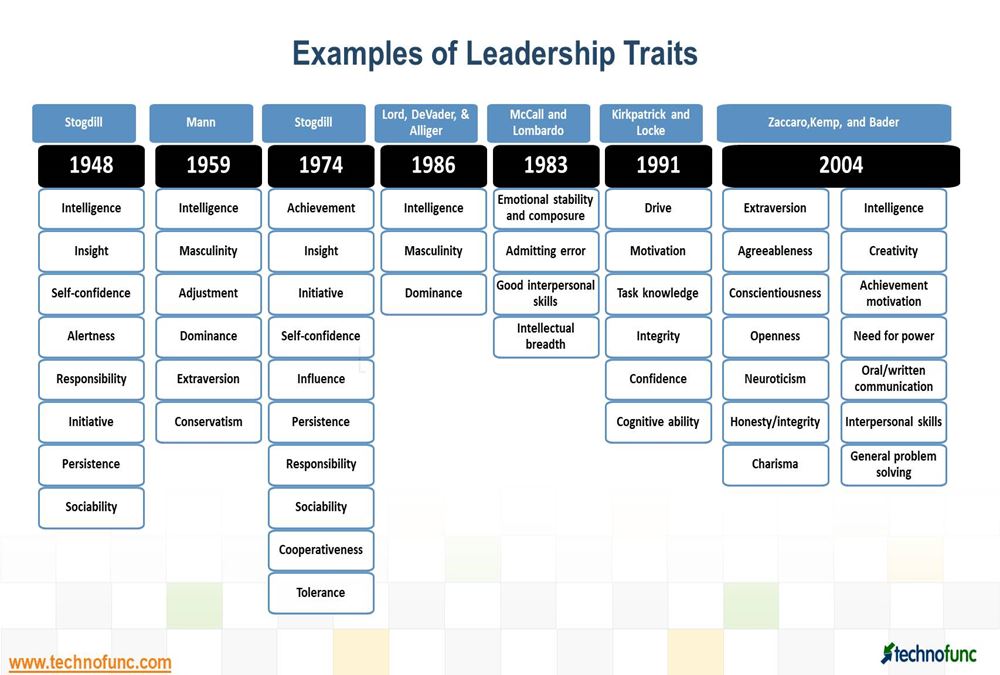- Home
- Business Processes
- Industry Knowledge
- Aerospace Industry
- Automotive Industry
- Banking Domain
- BFSI Industry
- Consumer/ FMCG Industry
- Chemicals Industry
- Engineering & Construction
- Energy Industry
- Education Domain
- Finance Domain
- Hospitality Domain
- Healthcare Industry
- Insurance Domain
- Retail Industry
- Travel and Tourism Domain
- Telecom Industry
- Leadership Skills
- eLearning
- Home
- Leadership
- Leadership Theories
- Trait Theory of Leadership
Trait Theory of Leadership
Trait Theory of Leadership is based on the assumption that people are born with inherited traits and some traits are particularly suited to leadership. The theory aims to discover specific leadership & personality traits and characteristics proven to predict the likelihood of success or failure of a leader.
What are Personality Traits?
The trait approach to personality is one of the major theoretical areas in the study of human personality and is focused on differences between individuals. The trait approach was one of the first systematic attempts to study leadership. The combination and interaction of various traits forms a personality that is unique to each individual. Trait theory is focused on identifying and measuring these individual personality characteristics known as Traits.
Traits: Also called dispositions, Traits can be defined as habitual patterns of behavior, thought, and emotion. Traits are relatively stable over time, differ across individuals and influence behavior. Traits are external behaviors that emerge from internal beliefs and processes.
What is Trait Theory of Leadership?
Trait Theory of Leadership is based on the assumption that people are born with inherited traits and some traits are particularly suited to leadership. People who make effective leaders have the right (or sufficient) combination of traits and great leaders has some common personality characteristics. Trait theories help us identify traits and dispositions that are helpful when leading others. This theory as described by Kelly (1974) attempts to classify what personal characteristics such as physical, personality and mental, are associated with leadership success. Trait theory relies on research that relates various traits to the success of a leader.
Quotes on Traits:
“Leadership consists not in degrees of technique but in traits of character; it requires moral rather than athletic or intellectual effort, and it imposes on both leader and follower alike the burdens of self-restraint.” - Lewis H. Lapham
“The screenwriters I know share a few personality traits and one of them is anxiety.” - Tony Gilroy
“I think in the end, when you're famous, people like to narrow you down to a few personality traits. I think I've just become this ambitious, say-whatever's-on-her-mind, intimidating person. And that's part of my personality, but it's certainly not anywhere near the whole thing.” - Madonna Ciccone
“The moment a person forms a theory, his imagination sees in every object only the traits which favor that theory” - Thomas Jefferson
Overview of Trait Theory of Leadership:
Early research on leadership was based on the psychological focus of the day, which was of people having inherited characteristics or traits. The trait theory of leadership focused on analyzing mental, physical and social characteristic in order to gain more understanding of what is the characteristic or the combination of characteristics that are common among leaders. There have been many different studies of leadership traits and attention was put on discovering these traits, often by studying successful leaders, but with the underlying assumption that if other people could also be found with these traits, then they, too, could also become great leaders.
Advantages of Trait Theory of Leadership:
The trait theory is naturally pleasing theory and gives constructive information about leadership. Lot of research has validated the foundation and basis of the theory and it can be applied by people at all levels in all types of organizations. Managers can utilize the information from the theory to evaluate their position in the organization and to assess how their position can be made stronger in the organization. It serves as a yardstick against which the leadership traits of an individual can be assessed and individuals can get an in-depth understanding of their identity and the way they will affect others in the organization. This theory makes the manager aware of their strengths and weaknesses and thus they get an understanding of how they can develop their leadership qualities. It gives a detailed knowledge and understanding of the leader element in the leadership process.
Examples of Leadership Traits:
A lengthy list of traits has been made to describe an effective leader in terms of certain characteristics. Given below is outcome of studies on leadership traits and characteristics with reference to timelines in terms of years:

Criticism / Arguments against - The Trait Theory of Leadership:
Many arguments are made against the leadership theory of traits and it has some inherent limitations as during the 1930s the field of Psychometrics was in its early years. The greatest argument is that if particular traits are key differentiator of leadership, then how do we explain people who possess these qualities but are not leaders? This question is one of the difficulties in using trait theories to explain leadership.
These characteristics according to some people are considered valid indicators of successful leaders, but if you compare leaders by various physical personality and intelligence traits, you may find very little agreement on these. Some findings point out to the fact that leaders are intelligent individuals. But they do not provide any clue as to whether leaders are brighter than their followers or are as close to them in intelligence.
This theory is quite complex and there is bound to be some subjective judgment in determining who is regarded as a ‘good’ or ‘successful’ leader and many of these factors are situational related factors. The followers have a significant effect on the job accomplished by the leader. Trait theory completely ignores the followers and the situations that also help a leader to be successful. To be more objective, traits of the person as well as demand of the situation together determine the effectiveness of the leader.
Some of the personality traits are overlapping with each other. Therefore, you need to be cautious in stating, personality or any other characteristic as a cause of successful leadership. You must ask the questions: Who is a successful leader? Is he far superior physically? Is he far brighter? Is he more mature as a person? Is he more motivated to achieve his goal? Does he have more consideration for his followers? Etc.
Moreover the list of possible traits tends to be very long and personality traits measurement weren't reliable across studies. More than 100 different traits of successful leaders in various leadership positions have been identified. These descriptions are simply generalities and there exists disagreement over which traits are the most important for an effective leader. This theory does not offer explanations between the relation of each characteristic and its impact on leadership. Some of the traits may describe a successful leader but predicting successful leaders on the basis of traits alone is not a correct approach.
Stogdill in 1948, suggested that no consistent set of traits differentiated leaders from non-leaders across a variety of situations implying that an individual with certain traits who has been successful in one situation might not be as effective in another situation and this led to researchers concluding that traits were to be considered as relative to the requirements of the situation.
Related Links
You May Also Like
-
Life cycle theory of Leadership
Situational Leadership Theory was first introduced in 1969 as the life cycle theory of leadership. This theory suggests that type of leadership style appropriate in a given situation depends on the maturity of the follower. As per life cycle theory, leader need to match the leadership style according to the situation and leader behavior varies as the group matures.
-
Five Factors Model (FFM) also known as Five-Factor Personality Model is based on five broad personality traits which are extraversion, neuroticism, openness to experience, agreeableness, and conscientiousness represented by acronym OCEAN, these traits are often referred to as the “Big Five”.
-
Early studies on leadership were done at Ohio State University using the Leader Behavior Description Questionnaire to identify the leader's observable behaviors. Ohio State study on leadership found two behavioral characteristics of leadership - people-oriented (consideration) and task-oriented (initiating structure) leadership style.
-
Transactional Analysis also is known as the theory of human personality was proposed by Eric Berne in the 1950s. This theory of transactional leadership defines three different ego states in a person who engages in transactions with another person's ego states. These three ego states refer to major parts of an individual's personality and reflect an entire system of thought, feeling, and behavior.
-
Maslow's hierarchy of needs is a motivational theory that explains that people are motivated by five basic categories of human needs. These needs are physiological, safety, love and belonging, esteem, and self-actualization. There is a little scientific basis for this concept of a hierarchy of needs.
-
Trait theories of leadership identify the specific personality traits that distinguish leaders from non-leaders. The trait model of leadership is based on the traits or characteristics of leaders that make them successful in their leading role. These theories use heritable attributes to predict leadership effectiveness.
-
Charismatic leadership is a trait-based leadership theory where the leaders act as visionary driven by their convictions and motivate their followers to work towards common vision using their charm and persuasiveness. These charismatic leaders act as role models and exhibit extraordinary characteristics that inspire devotion and motivation in followers to persuade change. Leaders are able to cultivate a profound sense of trust with the group of followers.
-
Symbolic Interaction and Social Change
George Herbert Mead, an American philosopher, affiliated with the University of Chicago founded the theory of symbolic interactionism. A major aspect of this is that people interact by symbols both verbal and non-verbal signals and every interaction makes a contribution to the mental make-up of the mind thus every interaction with someone, changes you and you go away a different person signifying that humans and change go together.
-
Functional leadership theory addresses specific leader behaviors that are expected to contribute most to the organizational effectiveness by focusing on how the leadership process occurs. The leader should ensure that all needs of the group get addressed.
-
The Systemic Approach to Leadership
The systemic approach to leadership looks at the organization as a whole and focuses on the understanding of the organization as a system. Moving to systems thinking demand managers to view organizations as organic systems. Leaders are also part of this complex system which is constantly undergoing change and evolving. The leaders need to manage the relations and networks within these systems by acting with systemic awareness.
Explore Our Free Training Articles or
Sign Up to Start With Our eLearning Courses

About Us
Learning
© 2023 TechnoFunc, All Rights Reserved










